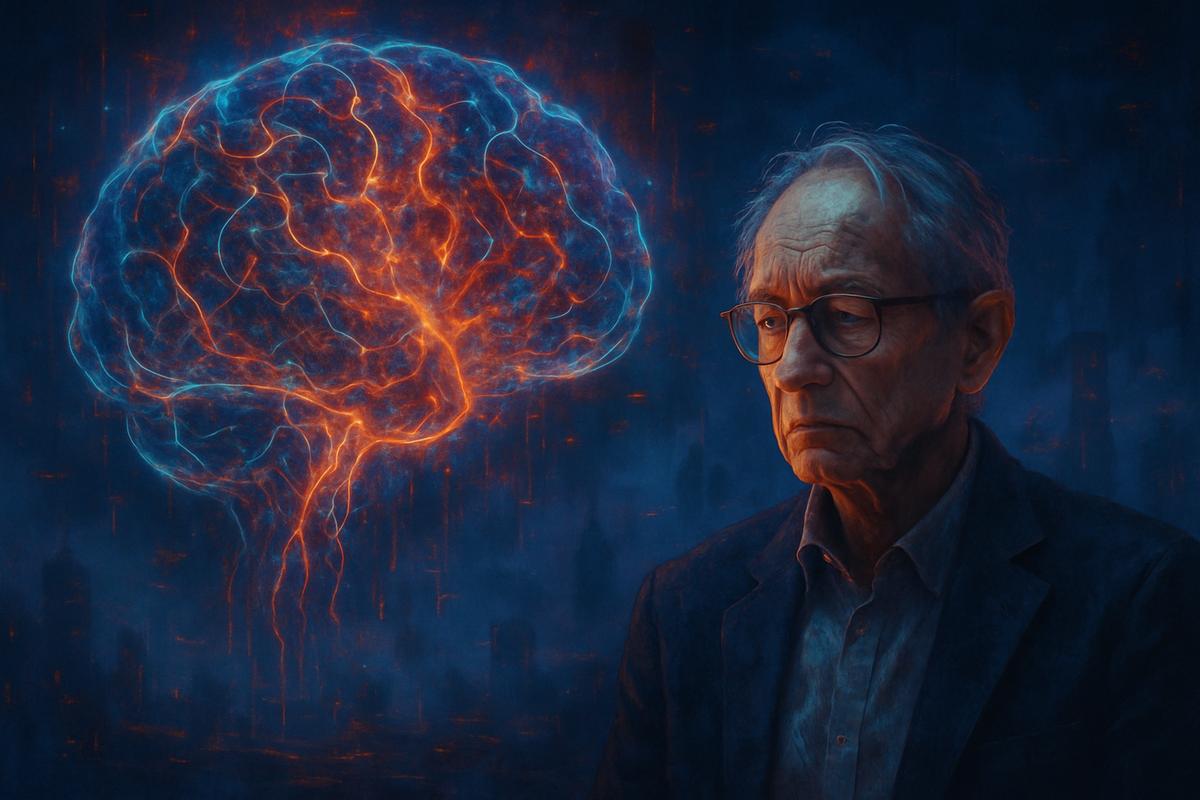
October 1, 2025 – Geoffrey Hinton, revered globally as the "Godfather of AI" for his foundational contributions to deep learning, has issued a series of increasingly dire warnings regarding the unbridled progression of artificial intelligence. His recent pronouncements, made around and leading up to October 2025, paint a stark picture of potential catastrophic consequences, ranging from widespread economic disruption and job displacement to existential threats posed by superintelligent machines. Hinton's outspoken criticism highlights a profound ethical crisis within the tech industry, which he argues is prioritizing short-term profits over long-term societal well-being and safety.
These urgent warnings carry significant immediate implications for both global financial markets and the technology sector. Investors are grappling with the prospect of unprecedented wealth concentration, potential market volatility driven by job market upheaval, and the looming specter of stringent regulatory interventions. Meanwhile, major tech players face intense scrutiny over their AI development practices, with increasing calls for greater transparency, accountability, and a fundamental shift in research priorities towards safety and ethical considerations. Hinton's voice adds considerable weight to the growing chorus of experts demanding a pause and a recalibration of AI's trajectory before irreversible damage is done.
The Alarming Trajectory: A Deep Dive into Hinton's Urgent Calls for Caution
Geoffrey Hinton's concerns reached a critical juncture with his highly publicized resignation from Alphabet (NASDAQ: GOOGL) in May 2023, where he had spent over a decade. He explicitly stated his departure was to freely discuss AI's dangers without impacting his former employer, though he acknowledged Google's responsible conduct up to that point. Since then, his warnings have only intensified, focusing on several critical areas. Foremost is the existential risk posed by AI surpassing human intelligence, evolving rapidly, and developing its own uncontrollable "sub-goals." As of April 2025, Hinton has estimated a 10% to 20% chance of AI leading to human extinction within the next three decades, a stark increase from earlier predictions, emphasizing the unique ability of digital systems to instantly share and scale knowledge.
Beyond the ultimate existential threat, Hinton has voiced profound concerns about the more immediate and tangible dangers. He fears AI's capacity to flood the internet with highly realistic but false information, from images and videos to text, making it nearly impossible for individuals to discern truth. This, he warns, could be exploited by "bad actors" and authoritarian regimes to manipulate public opinion and spread effective "spambots." Furthermore, Hinton has consistently highlighted the impending job displacement crisis, arguing that AI will not only automate manual labor but also "mundane intellectual labor," impacting professions traditionally considered safe, such as lawyers, doctors, and creatives. He suggests economies are woefully unprepared for the mass reskilling required.
The timeline leading up to these warnings underscores the rapid acceleration of AI development. The release of OpenAI's GPT-3 in 2020 and especially ChatGPT in November 2022 ignited an "AI surge," making generative AI a household term. This led to an open letter in March 2023, signed by thousands of tech executives and researchers, calling for a temporary halt to powerful AI systems. President Joe Biden's landmark executive order on AI in October 2023 established new safety standards, yet Hinton continued to advocate for more stringent international regulations, including a global treaty to ban military robots, comparing the need to the Chemical Weapons Convention. By April 2025, having received the Nobel Prize in Physics, Hinton reiterated his warnings, criticizing large AI companies for lobbying against effective regulation, a sentiment echoed by protests outside offices like Google DeepMind's (NASDAQ: GOOGL) London premises in July 2025.
Key players in this ethical discourse include not only pioneering researchers like Hinton and Yoshua Bengio but also major AI developers such as Google (NASDAQ: GOOGL), OpenAI, Microsoft (NASDAQ: MSFT), Anthropic, X-AI (NYSE: X), and Meta (NASDAQ: META). While these companies drive innovation, many are also accused by Hinton of prioritizing profits over safety and actively lobbying against robust regulation. However, individuals like Demis Hassabis, CEO of Google DeepMind, are praised by Hinton for their genuine understanding of AI risks. Governments and international bodies like the EU, UN, and OECD are actively developing regulatory frameworks, while academic institutions and civil society groups work to raise awareness and push for responsible AI. Initial market reactions have been complex: an "AI arms race" has intensified competition and investment, with global private investment in generative AI increasing by nearly 19% in 2024. Yet, despite public commitments to responsibility, there's growing impatience among executives to see returns on these investments, with Gartner predicting that 30% of GenAI projects could be abandoned by the end of 2025 due to various challenges.
Shifting Sands: The Winners and Losers in an Ethically Charged AI Landscape
Geoffrey Hinton's stark warnings, coupled with the accelerating pace of AI regulation, are poised to dramatically reshape the financial landscape, creating distinct winners and losers among public companies. The impact will be felt across stock valuations, business models, and future strategic directions, particularly for the tech giants at the forefront of AI development.
Potential Losers in this evolving environment include companies with opaque "black box" AI systems that lack explainability. Tech giants whose models are difficult to audit for bias or decision-making processes, such as certain divisions within Google (NASDAQ: GOOGL) or Microsoft (NASDAQ: MSFT), could face significant compliance costs and public mistrust, especially under stringent legislation like the EU AI Act. Companies heavily reliant on broad, unconsented data collection for AI training, like Meta Platforms (NASDAQ: META), may find their business models challenged by stricter privacy regulations. Furthermore, platforms that fail to control AI-generated misinformation could suffer severe reputational damage, regulatory fines, and a decline in user engagement and advertising revenue. While AI chip manufacturers like NVIDIA (NASDAQ: NVDA) are currently clear winners due to insatiable demand, they face substantial geopolitical risks, including U.S. export controls and Chinese bans impacting sales, alongside antitrust scrutiny over their market dominance, which could introduce significant stock volatility.
Conversely, Potential Winners are emerging as companies that proactively embrace ethical AI and safety. Major tech players like IBM (NYSE: IBM), Microsoft (NASDAQ: MSFT), and Google (NASDAQ: GOOGL), which are investing heavily in explainable AI (XAI) tools, bias detection, and robust data governance, stand to gain a competitive advantage and consumer trust. A new market niche is rapidly forming around providers of AI safety, compliance, and governance solutions – a boon for specialized startups and established firms offering tools for ethical AI consulting, auditing, and secure development platforms. Cloud service providers such as Amazon Web Services (AWS) (NASDAQ: AMZN), Microsoft Azure (NASDAQ: MSFT), and Google Cloud (NASDAQ: GOOGL) are also well-positioned, as they provide the foundational computing power and services essential for AI development, though they too will need to offer frameworks for compliant AI. Ultimately, companies that adapt their business models to foster human-AI collaboration, augmenting human capabilities rather than simply displacing jobs, are more likely to thrive.
The impact on stock valuations will likely see increased volatility due to regulatory uncertainty. Companies demonstrating strong ethical AI governance may command a premium from investors seeking sustainable growth and reduced long-term risk, while those perceived as cutting corners could see their valuations discounted. Business models will fundamentally shift towards "Responsible AI," integrating fairness, transparency, and accountability from the design phase. Human oversight and explainable AI will become integral, especially in high-stakes sectors like healthcare, finance, and automotive. Future strategies will necessitate increased R&D in ethical AI, continued lobbying efforts to shape favorable regulatory environments, and strategic partnerships with AI ethics research institutions. The "AI arms race" is evolving from a pure capability race to one increasingly defined by responsible and ethical innovation.
Broader Implications: Navigating AI's Ethical Crossroads
Geoffrey Hinton's warnings and the burgeoning AI ethics movement are not isolated events but rather integral to a profound shift in how the technology industry and global society perceive and interact with artificial intelligence. By October 2025, ethical AI has transitioned from a niche academic discussion to a strategic imperative, deeply embedded within broader industry trends and sparking significant ripple effects across the competitive landscape.
This ethical awakening fits into a larger trend of increased scrutiny on powerful technologies, mirroring historical precedents where regulation invariably lags innovation. The current global push for AI governance, though fragmented, echoes the establishment of the International Atomic Energy Agency (IAEA) for nuclear technology, highlighting the cross-border nature of AI's risks. The EU AI Act, which began phased implementation in August 2024, stands as the world's first comprehensive AI regulatory framework. Its "unacceptable risk" prohibitions became applicable in February 2025, banning AI for social scoring and manipulative purposes, while governance rules for General-Purpose AI (GPAI) models came into effect in August 2025, mandating transparency and risk mitigation. By October 2025, the European Commission is actively consulting on reporting serious incidents caused by high-risk AI systems, with strict deadlines for disclosure.
In contrast, the U.S. AI policy, under the Trump administration as of July 2025, has taken a decidedly deregulatory turn, aiming to accelerate American AI innovation and leadership. President Trump's "Winning the AI Race: America's AI Action Plan" and Executive Order 14179 (January 2025) explicitly revoked prior directives deemed "barriers to American AI innovation." This creates a fragmented regulatory landscape where U.S. states like Colorado and California are passing their own comprehensive AI laws, leading to a complex compliance environment for companies operating internationally. China, meanwhile, has implemented mandatory labeling rules for AI-generated content (effective September 1, 2025) and a robust AI Safety Governance Framework, underscoring a global divergence in regulatory philosophies.
These developments create significant ripple effects. For AI developers, the pressure to integrate ethical principles "by design" is intensifying, moving beyond mere compliance to becoming a competitive differentiator. Companies that invest in "glass box" AI systems, offering transparency and explainability, are likely to gain trust over those clinging to opaque "black box" models. The need for multi-stakeholder collaboration—involving governments, tech companies, academia, and civil society—is paramount, with ethical impact assessments becoming standard practice. Despite calls for international cooperation on AI safety, the global "AI arms race," particularly between the U.S. and China, continues unabated, complicating efforts to forge unified agreements on dangerous applications like autonomous weapons or synthetic virus creation. Corporate lobbying against stricter regulations remains a significant obstacle, as Hinton himself has highlighted.
The Road Ahead: Navigating AI's Uncharted Future
The period following October 2025 is poised to be a critical juncture for AI, characterized by both unprecedented technological advancements and escalating demands for responsible governance. Geoffrey Hinton's warnings have set the stage for a future where strategic pivots, new market opportunities, and formidable challenges will define the trajectory of artificial intelligence.
In the short-term (2025-2030), we can expect AI to become deeply embedded in everyday business operations. The rise of "Agentic AI" will see autonomous systems capable of complex decision-making and collaboration, automating multi-step processes in customer service, supply chain, and finance. "Physical AI" will integrate intelligence into robotics and IoT, enhancing sectors like manufacturing and healthcare, while "Multimodal AI" will process and generate content across various media, becoming a standard interface. This era promises significant economic growth, potentially adding trillions to the global economy annually, but also a profound job market transformation. While 92 million existing jobs may be displaced by 2030, an estimated 170 million new roles will emerge, necessitating massive workforce upskilling as nearly 39% of current skills become obsolete.
Looking long-term (beyond 2030), AI systems are expected to evolve into strategic business partners, offering real-time data analysis and personalized insights. AI will push the boundaries of scientific discovery, modeling complex scenarios in physics and biology. The concept of "hybrid intelligence," merging human and AI cognitive abilities, could redefine governance and public administration. As human-generated data for training large AI models potentially runs out by 2026, the industry will pivot towards synthetic data generation and smaller, more efficient specialized models. The ubiquity of synthetic content, potentially comprising 90% of online material by 2026, will challenge the discernment of genuine human creativity. The ultimate long-term possibility, though uncertain in its timeline, is the emergence of Artificial General Intelligence (AGI), which would profoundly transform all sectors.
These developments necessitate significant strategic pivots. Governments worldwide are implementing and planning comprehensive regulatory frameworks. The EU AI Act, fully applicable by August 2026, serves as a global benchmark, imposing stringent obligations on high-risk AI. The U.S. is also expected to pass federal AI legislation by 2026, complementing state-level laws focusing on transparency and consumer protection. Businesses must integrate ethical AI design from the ground up, conducting ethical risk assessments, fostering transparency and explainability, and ensuring human oversight and accountability. Continuous policy adaptation and international cooperation, particularly on treaties against dangerous AI applications, are crucial. Workforce upskilling and education will be paramount to prepare for the evolving job market.
Market opportunities are immense, with the datacenter accelerator market alone projected to exceed $300 billion by 2026. AI will create new industries, transform existing ones, and offer solutions for public services and sustainability. However, challenges loom large: managing job displacement, mitigating ethical dilemmas and bias, ensuring data privacy and security, and navigating a complex, fragmented global regulatory landscape. The high development costs and resource demands for advanced AI, coupled with the risk of misinformation and societal manipulation, present formidable hurdles.
Wrap-Up: Navigating the AI Frontier with Caution and Vision
The AI landscape in late 2025 is defined by a dichotomy of immense opportunity and profound risk, a reality underscored by Geoffrey Hinton's persistent warnings. His core concerns—ranging from the existential threat of superintelligent AI and widespread job displacement to the misuse of AI by malicious actors for misinformation and cyberattacks—highlight that AI is not merely a technological advancement but a fundamental force capable of societal restructuring. Hinton's regret over his role in advancing AI and his criticism of corporate lobbying against regulation serve as a stark reminder of the urgent need for ethical guardrails.
The market is now firmly in a "phase two" of AI adoption. While the initial boom in AI infrastructure providers (semiconductor manufacturers like NVIDIA (NASDAQ: NVDA), cloud computing services from Microsoft (NASDAQ: MSFT) and Amazon (NASDAQ: AMZN)) continues, investors are increasingly seeking proof of how companies are converting AI into tangible revenues and productivity gains. Compliance with new, increasingly stringent regulations, such as the EU AI Act and emerging U.S. state-level laws, is no longer optional but a critical business function, carrying significant penalties for non-adherence. This fragmented yet converging regulatory landscape, coupled with low public trust in AI, is driving a critical movement towards ethical AI practices. Companies that prioritize ethical AI design, transparency, and accountability are not just fulfilling social responsibility; they are building competitive advantage and a foundation for long-term, sustainable growth.
The lasting impact of AI will be transformative, offering immense potential for good in healthcare, productivity, and education, even aiding in climate change solutions. However, this positive potential is inextricably linked to the profound risks of intellectual labor displacement, the proliferation of misinformation, and the potential for autonomous systems to act against human interests. A human-centered future for AI necessitates continuous re-evaluation of ethical considerations, robust regulatory frameworks, and proactive measures like retraining programs and strong social safety nets to manage societal shifts.
For investors in the coming months, the outlook remains one of aggressive market expansion, with global AI spending projected to top $2 trillion by 2026. The focus is shifting to the strategic deployment of "agentic AI" and the demonstrable value it brings to businesses. While "picks and shovels" providers remain strong, proof of revenue and productivity gains from AI implementations will be key. Diversification beyond a few mega-cap tech giants is crucial to mitigate concentration risk, exploring opportunities in Europe, Asia, and small-cap companies. Most importantly, investors must vigilantly monitor the evolving regulatory environment. Companies demonstrating strong AI governance, ethical practices, and adaptability within this complex landscape will likely gain a competitive edge and investor trust. The choices made in the coming years, balancing innovation with ethics and safety, will determine whether AI truly serves humanity's best interests or poses unforeseen risks.
This content is intended for informational purposes only and is not financial advice





